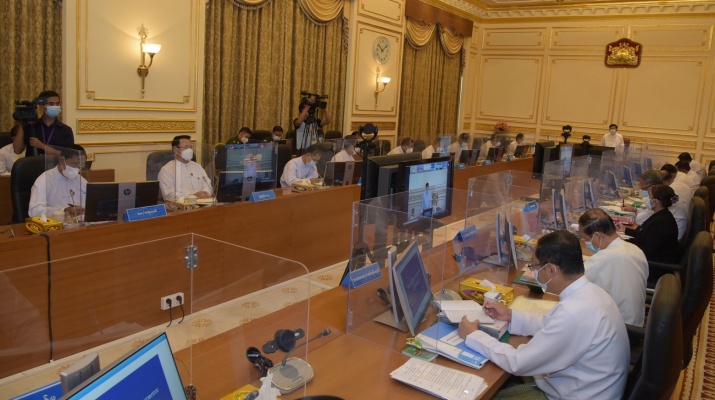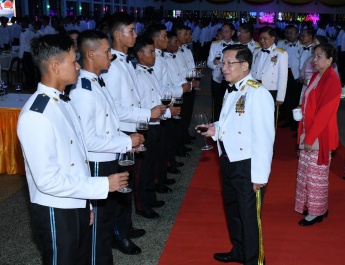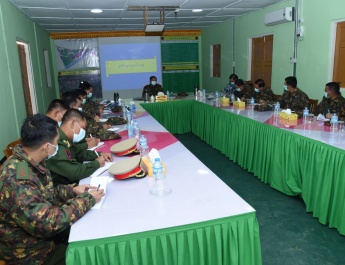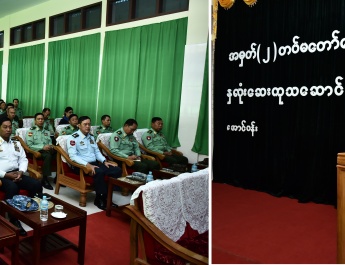Nay Pyi Taw September 22
National Planning Commiss-ion held its meeting 1/2021 this morning at the meeting hall of State Administration Council Chairman’s Office in Nay Pyi Taw with an address by National Planning Commission Chairman State Administrat-ion Council Chairman Prime Minister of the State Senior General Min Aung Hlaing.
Also present were NPC Vice Chairman SAC Vice Chairman Deputy Prime Minister Vice-Senior General Soe Win, SAC member Lt-Gen Moe Myint Tun, union ministers General Mya Tun Oo, Lt-Gen Soe Htut, U Wunna Maung Lwin, Lt-Gen Yar Pyae, U Chit Naing, U Win Shein, Lt-Gen Tun Tun Naung, U Aung Naing Oo, U Ko Ko Hlaing, Dr Daw Thida Oo, U Maung Maung Ohn, U Ko Ko,
U Hla Moe, Admiral Tin Aung San, U Khin Maung Yi, U Aung Than Oo, Dr Charlie Than, U Khin Yi, Dr Pwint Hsan, Dr Myo Thein Kyaw, Dr Thet Khaing Win, U Min Thein Zan, U Shwe Lay, Dr Thet Thet Khaing, Dr Htay Aung, U Saw Tun Aung Myint and Union Auditor-General Dr Kan Zaw.
The chairman of Union Civil Service Board, the governor of Central Bank of Myanmar, the chairman of Nay Pyi Taw Council, chief ministers of re-gions and states, chairmen of leading bodies of self-admini-stered division and zones took part in the meeting through Video Conferencing.
In his opening speech, the Senior General said the adoption of six-month national plann-ing law for financial year 2021-2022 will be approved at this meeting through the discussions with union ministers, the union attorney-general, the union auditor-general, the chair-man of Nay Pyi Taw Council, chief ministers of regions and states.
Formerly, the financial year was fixed between October and September. But the fin-ancial year 2022-2023 will be fixed between April and March. Hence, arrangements have been made to adopt the six-month national planning law from October 2021 to March 2022.
SAC assumed duties of State on 1 February 2021 and is stri-ving for national development by adopting the five-point roadmap and nine objectives. Moreover, it is making utmost efforts for the resurgence of the COVID-19-hit national eco-nomy as a priority task.
World countries including Myanmar approved the imple-mentation of Sustainable De-velopment Goals-SDGs 2015-2030. Sector-wise and area-wise plans must be implemented through coordination to fully realize the SDGs. Myanmar sent the progress report on SDGs to the UN Economic and Social Department in time. The State is implementing necessary tasks to graduate from LDC category. Moreover, projects and work programs must also be implemented to meet the graduation norms.
The government is prioritizing the task of ensuring suffi-cient food, clothing and shelter for the people, narrowing the urban-rural gap, alleviating poverty. So, the respective union ministers and chief ministers should make coordinated eff-orts. The adopted political, economic and social objectives are aimed at ensuring national prosperity and abundant food supply.
Due to COVID-19 that broke out in March 2020, service-pro-viding businesses including tourism, some SMEs and certain production businesses came to a stop or faced a drop in capacity. Hence, the national economy started to fall from the third quarter of the financial year 2019-2020 and it continued till the first six months of financial year 2020-2021. The goal of the six-month national plan is for the revival of national economy and social undertakings to help develop socio-eco-nomy. So, special efforts must be made to reach the sectorwise and region/state-wise targets during the six months. Only then will nation gain a quick win.
Myanmar is an agro-based country. Rural people earn their living on farming. So, provision of an adequate amount of inputs and agriculture loans is a priority tasks to in-crease their earnings. An agro-based country must understand the importance of providing adequate water supply, nece-ssary chemical fertilizers, quality strains, animal feed, pesti-cides, vaccines and medicines. It must lay down plans to fulfill those requirements. Moreover, efforts should be made to grow climate-friendly and marketable crops, apply modern methods,farm machinery and pest control measures and establish high-standard farming. The country needs to continuously produce farming experts, en-gineers, technicians to reach this end. On the other hand, extreme use of pesticides must be prevented for food safety and conduct organic farming that meets the international standard.
Livestock breeding zones must be set up, natural and man-made water bodies must be provided with fingerlings, quality strains must be distri-buted for manageable-scale faming, modern farming methods must be adopted, and animal vaccination programs must be launched to raise in-come from increasing farm exports.
In taking measures for eco-nomic development, different situations may vary. Some regions and states may have dvantages in agriculture and livestock breeding while others may have advantages in industrial and services sectors.
It is necessary to realize eco-nomic development of respective regions by utilizing the advantages as opportunities.
For the socio-economic de-velopment of people in rural areas, states are required to manufacture products under the One Village, One Product (OVOP) system by utilizing the regional advantages and it is important to boost incomes by encouraging small and medium-sized enterprises and manageable level family businesses in respective regions.
It is vital to create job opport-unities to help people who worked in other countries and had to return to Myanmar due to the outbreak of COVID-19.
By doing so, labour drain can be reduced and this will be helpful for local businesses. Moreover, efforts must be exerted to reopen and operate factories which were closed due to COVID-19 to their full capacity.
As a large sum of foreign exchange has to be spent on imports, it is necessary to en-courage the manufacturing of products to substitute imports logically. Total acreage of cotton in the 2010-2011 fiscal year reached more than 800,000 acres. Low yields of cotton lead to economic losses and affect the supply chain in production of cloth. If efforts can be made to increase the total acreage of cotton to 800,000 acres and yields can be boosted to 800 and 1,000 visses per acre, the local textile industry will be able to enjoy progress and incomes will increase from cotton and textile exports. Similarly, large amounts of foreign exchange have to be spent on imports of edible oil, fuel oil and fertilizers for agriculture. Myanmar pos-sesses favourable land, water and natural resources while natural gas can be extracted to some extent. Therefore, enough edible oil can be produced locally from oil palm, niger, sunflower, soy beans, maize, peanuts and sesame. Natural gas is extensively used for generation of electricity and a large volume of diesel is used for transportation and indust-ries. By placing emphasis on generation of electricity from renewable energy such as solar and hydro power, more natural gas can be used for production of fertilizers. Im-ports must be reduced by pro-duction of animal feeds from agricultural products locally.
The use of firewood and charcoal for cooking must be re-duced. Production and use of electric vehicles and expansion of electric railroads, the use of fuel must be reduced. It is important to reduce the environ-mental pollution and to contribute to environmental conser-vation. Domestic and foreign investors have been invited for such tasks. On the other hand, efforts must be made to reduce the trade deficit by boosting ex-ports and manufacturing value-added products. As Myanmar mainly depends on agriculture and livestock breeding, indust-ries based on such resources must be established without fail. Economy of the country will certainly rise when the production of the two sectors is boosted.
As the upcoming six-month plan coincides with the open season, it is necessary to com-plete existing tasks and in industrial, construction and ele-ctricity sectors and new projects must be implemented as scheduled. As the tasks will be carried out with the use of state funds as well as loans, it is important to complete them according to their schedules without any wastage. Emphasis must be placed on austerity by purchasing only essential
things and constructing essential ones during the six-month plan. Moreover, contribution to the economy can be made by implementing public-private-partnership programs in accor-dance with rules, regulations and laws.
To narrow the gap between urban areas and rural areas, it is necessary to boost the rural economy. To raise the living standards of people in rural areas, it is important to supply electricity and water and to build production roads in rural areas. For generation of electricity, efforts should be made to use solar energy. To boost rural economy and production, it is necessary to
effectively implement the coo-perative system in which the public can participate directly.
It is essential to make concer-ted efforts to provide quality services in social sectors such as education, health, social welfare, rescue and resettle-ment. Efforts must be made for development of a quality education system and high qualification of teachers to nurture competent scholars in the education sector. It is neces-sary for the Ministry of Health and relevant departments to cooperate in research to produce COVID-19 treatment me-dicines and vaccines. As people can work only when they are healthy, it is also important to encourage fine habits of taking interests in sports including Myanmar sports for physical fitness.
Like other countries, Myanmar has suffered natural disa-sters such as flooding and drought occurred due to climate change, and it is needed to make plans on taking pre-ventative measures and carrying out rescue activities from time to time. To respond to climate change, special conside-ration must be given to taking environmental conservation tasks such as conservation of reserved forests and natural forests. If we make efforts all together, I am fully confident that the country will be at a medium level in five years in ASEAN and will become a top country in 10 years. The nation’s strength lies only within. Nothing is impossible if there is a combined use of human resources, sense of harmony and natural resources.
In the present period of the six-month project, all are to make collective efforts to im-plement the original goals of the project laid down on a re-gion-and-sector-wise basis as near as possible. Special atten-tion must be given to sustain-able implementation of the tasks being jointly taken by the government and the private sector with momentum, achiev-ing an increase in the volume of investments and domestic production and recovery of the hotel and tourism industry. It is required for all to give special consideration on narrowing the gap between the goal and the implementation of the tasks.
All are urged to work all together to achieve the set goals of the project within six months from October to March in the fiscal year of 2021-2022 in accordance with the Five-Point Roadmap and Nine Objectives laid down by the State Administration Council.
Then, Vice-Senior General Soe Win briefed on the state of achieving success in imple-menting the projects on a re-gion-and-ministry-wise basis in the project term during the COVID-19 period, the state of making projects and objectives in accordance with the FivePoint Roadmap and Nine Objec-tives laid down by the State Ad-ministration Council, the state of making plans for political, economic and social stability of the State and socio-economic improvement, the state of speeding up the momentum for recovery of the business en-terprises damaged due to the COVID-19, the state of taking measures to control waste in the tasks being implemented with the funds of the State, loan and cash assistance, com-piling records on the project tasks, taking lessons through overcoming the difficulties encountered in carrying out the tasks, and the state of cooperation and coordination for achieving the goals of the projects.
Afterwards, Secretary of the Committee Union Minister of Planning and Finance U Win Shein briefed on drawing the six-month national project (draft proposal) in the fiscal year of 2021-2022, appraisal on foreign loans of the nation, and matters on tax collection.
Next, union ministers and the Union Auditor-General reported on sector-wise projects drawn by the ministries and organizations concerned and implementation of the projects.
In giving necessary instruc-tions, the Senior General said it was required for responsible organizations concerned to make cooperative efforts in order that the environment and natural resources will not be damaged and lost due to the natural disasters and malpractices. It is needed to extract timber for domestic timber production in accordance with the set rules and re-gulations. Ministries concern-ed are needed to give special attention to providing supervi-sory measures to eliminate timber smuggling and illegal timber mills.
Regarding the taxes, a govern-ment stands and acts on taxes and it is necessary to make efforts to have an increase in the number of tax paying
people rather than to raise taxes as the nation is a develop-ing country. There has been a decrease in earning taxes during the COVID-19 period as well as a cut in collecting taxes. The civil servants who joined CDM are politically instigating measures not to collect taxes as well as not to pay taxes.
Such an act of those people must be revealed. Civil servants are needed to be clear of the party politics and to discharge duties for achieving success in implementing the government tasks. It is found that there was tax evasion and tax avoidance. There have been many who have not paid taxes in the country. Technology on collecting taxes is to be updated and improved. The mi-nistries concerned need to harmoniously make efforts to fully earn taxes.
With regard to loans, the number of loans has increased due to non-income activities in the State. The aftermath of business failure is the rise in debt. Some countries also have debts. In order to reduce foreign debt, our country must increase domestic production and develop the country’s economy. It needs to be used effectively to make loans more economically viable.
There are many disadvan-tages for the country due to the suspension of foreign loans. Therefore, we are working to continue the work that should be done. Ministries need to cooperate with the government and the private sector in manu-facturing. Factory and work-shops need to be upgraded to increase productivity. It is ne-cessary to carry out the activi-ties systematically to increase the basic production of the country with loans. Therefore, it is necessary for the relevant authorities to systematically scrutinize according to the business sector.
Businesses that depend on surface and underground resources for environmental protection must be reduced mainly to avoid for timber and gems production. Only the required amount of oil and natural gas for factories and work-shops should be produced. In order to get energy, we have to focus on renewable energy. In working for the development and prosperity of the country, the existing principles must be applied. The purpose of plann-ing is to set expectations based on possible circumstances. In doing so, it is necessary to match the actual situation of the national characteristics of the country and the people. The Senior General reiterated the need to make full use of existing resources to give space to the people to achieve the set goals.
The Senior General said in his concluding remarks that the six-month national plan was drawn up based on the five future plans and nine objectives of the State Administration Council. It is seen that there are plans for action projects that should be implemented as a bridge before the next financial year. These are projects that put to revive the stagnant economy on the right track due to the COVID-19. Ministries and local governments must coordinate and keep steady of the implementation of national plans and local projects as soon as they are approved. In doing so, if there are conditions and reasons that may affect the implementation of the project and cause delays, they should be instructed to make timely preparations.
Expenditures in the implementation of the project shall be used systematically in accordance with the state financial regulations and the rules as well as to keep a systematic record of every activity and pre-pare for auditing. In addition, inputs must be used efficiently with less waste. It is necessary to constantly monitor the im-plementation status of the projects.
We must do our best to attract investment and to achieve export and sectoral targets and export targets as planned in the project. Businesses that can create new job opportunities also need to be encouraged. The key is to be prudent to save money, and if revenue and expenses are scrutinized, there will be a chance for the project to succeed.
Public-private partnerships must be strengthened to meet the basic needs of the people. The Senior General also urged the people to work hard for the recovery of economy and social conditions due to COVID-19 and to submit any issues that need to be supported by the State in line with the time during the implementation of the project.





